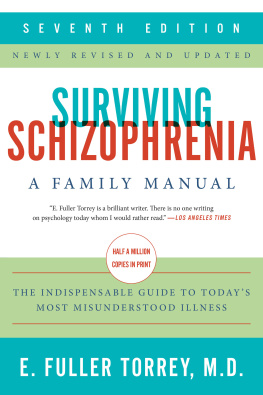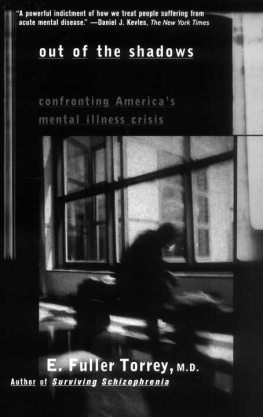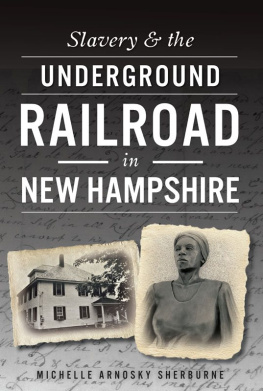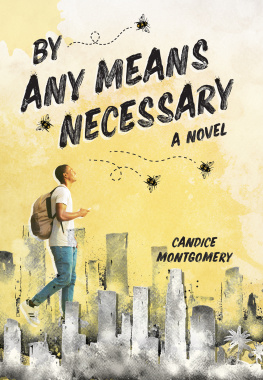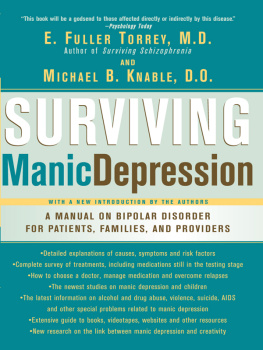THE
MARTYRDOM OF
ABOLITIONIST
CHARLES TORREY
Antislavery, Abolition, and the Atlantic World
R. J. M. Blackett and James Brewer Stewart, Editors
THE
MARTYRDOM OF
ABOLITIONIST
CHARLES TORREY
E. FULLER TORREY
LOUISIANA STATE UNIVERSITY PRESS
BATON ROUGE
Published by Louisiana State University Press
Copyright 2013 by Louisiana State University Press
All rights reserved
Manufactured in the United States of America
First printing
Designer: Laura Roubique Gleason
Typeface: Kepler MM
Printer and binder: Maple Press
Library of Congress Cataloging-in-Publication Data
Torrey, E. Fuller (Edwin Fuller), 1937
The martyrdom of abolitionist Charles Torrey / E. Fuller Torrey.
pages cm. (Antislavery, abolition, and the Atlantic world)
Includes bibliographical references and index.
ISBN 978-0-8071-5231-7 (cloth : alk. paper) ISBN 978-0-8071-5232-4 (pdf) ISBN 978-0-8071-5233-1 (epub) ISBN 978-0-8071-5234-8 (mobi) 1. Torrey, Charles T. (Charles Turner), 18131846. 2. Torrey, Charles T. (Charles Turner), 18131846Trials, litigations, etc. 3. Torrey, Charles T. (Charles Turner), 18131846Imprisonment. 4. Torrey, Charles T. (Charles Turner), 18131846Death and burial. 5. AbolitionistsUnited StatesBiography. 6. AbolitionistsMarylandBiography. 7. Underground RailroadMaryland. 8. Antislavery movementsMarylandHistory19th century. 9. Fugitive slavesMarylandHistory19th century. 10. ClergyNew EnglandBiography. I. Title.
E449.T69T67 2013
326.092dc23
[B]
2013008666
The paper in this book meets the guidelines for permanence and durability of the Committee on Production Guidelines for Book Longevity of the Council on Library Resources.

For Halsey and Sandra
Although our brother lie asleep,
Mans heart still struggles, still aspires;
His grave shall quiver yet, while deep
Through the brave Bay States pulses leap
Her ancient energies and fires.
James Russell Lowell, On the Death of Charles Turner Torrey, 1846
CONTENTS
PREFACE
Martyr Charles Turner Torrey, the Abolitionist was one of twelve names on the yellowing piece of paper to which my mother vainly tried to direct my attention. The paper was titled Prominent Torreys, but despite sharing a few genes, distant relatives held little interest for a teenage boy. Besides, our family was definitely not the kind to produce martyrs.
Many years later, I came across Charles Torreys name connected to the Underground Railroad in Maryland. That got my interest, so I queried the few references available. They revealed that Torrey had challenged abolitionist leader William Lloyd Garrison, had been called the father of the Underground Railroad, and had freed more slaves than had Harriet Tubman. One article also stated that Charles T. Torrey is now generally forgotten by historians of antebellum America, which appeared to contradict his accomplishments. I therefore undertook additional investigation.
This book is the product of that investigation, which unearthed a brief but rich life. As Henry Stanton described it at Torreys funeral: The events of Mr. Torreys life, while engaged in those peculiar enterprizes which marked the two last year [sic] of his efforts in the anti-slavery cause, would, if written, possess all the charms of romance. All who can appreciate the thrilling interest which the history of these events would excite in every bosom where dwells a soul, will regard it as among not the least of the calamities of his death, that his graphic pen could not leave them to the world as the best vindication of his fame.
Almost all Torreys in America are descendants of four brothers who landed in 1640 at the Massachusetts Bay Colony. Charles was a fifth-generation descendant of James, who settled in Scituate, and I am a ninth-generation descendant of William, who settled a few miles further north in Weymouth.
This book focuses on Charles Torreys efforts to combat racism and slavery. The depth of the race problem in the 1830s and 1840s was extraordinary. For example, in 1836, James Hammond, a South Carolina congressmen and one of the leading defenders of slavery, suggested to Congress that all abolitionists deserved to be killed as ignorant, infatuated barbarians. Regarding the freeing of slaves, he added:
Although I am perfectly satisfied that no human process can elevate the black man to an equality with the whiteadmitting that it could be doneare we prepared for the consequence which then must follow? Are we prepared to see them mingling in our legislatures? Is any portion of this country prepared to see them enter these halls and take their seats by our sides, in perfect equality with the white representatives of an Anglo-Saxon raceto see them fill that chairto see them placed at the heads of your Departments; or to see, perhaps, some Othello, or Toussaint, or Boyer, gifted with genius and inspired by ambition, grasp the presidential wreath, and wield the destinies of this great republic? From such a picture I turn with irrepressible disgust.
We sometimes forget how far we have come.
ACKNOWLEDGMENTS
Paternity of this book is attributable principally to two men. Stanley Harrold, professor of history at South Carolina State University, published the initial research on Charles Torrey, and without it this book would not have been conceived. Rand Dotson, an editor at Louisiana State University Press, saw promise in an earlier draft and persisted until I got it right; without him, it would not have been born.
Librarians are a biographers best friends. I am especially grateful to Sean Casey, Kim Reynolds, and Barbara Davis at the Boston Public Library; Jessica Steytler and staff at the Congregational Library in Boston; Auburn Nelson at the Schomburg Center of the New York Public Library; Tammis Groft at the Albany Institute of History and Art; Katherine Carr at the University of Missouri Library; Nicolette Dobrowolski at the Syracuse University; and the library staff of the Uniformed Services University of the Health Sciences. Many people at historical societies also went out of their way to be helpful, including Diane Rofini at the Chester County Historical Society; Henry Peden at the Harford County Historical Society; Carol Miles at the Scituate Historical Society; Margaret Maxwell at the Medway Historical Society; Jocelyn Gould at the Massachusetts Historical Society; and Elizabeth Plummer at the Ohio Historical Society.
I thank the following for permission to quote from letters in their collections: the Chester County Historical Society in Pennsylvania; the Ohio Historical Society; the trustees of the Boston Public Library/Rare Books Collection; the Special Collections Research Center, Syracuse University Library; and the Congregational Library in Boston.
I am deeply indebted to the two historian reviewers of the manuscript, Professors James Brewer Stewart of Macalester College and R. J. M. Blackett of Indiana University. They deserve much of the credit for whatever merit exists in the final product. Robert Taylor, Jerry Lynn, Halsey Beemer, and Judith Phelps also provided useful suggestions, and Chris Gillis contributed the map of Charles Torreys Underground Railroad route. Lee Sioles and Stan Ivester guided the manuscript through the shoals of the editorial process in a skillful manner, and Judy Miller again provided excellent administrative and editorial support. And I am indebted to my wife, Barbara, for steering me to Charles Torrey and for cheerfully keeping dinner waiting and all the things that make writing a book possible.


